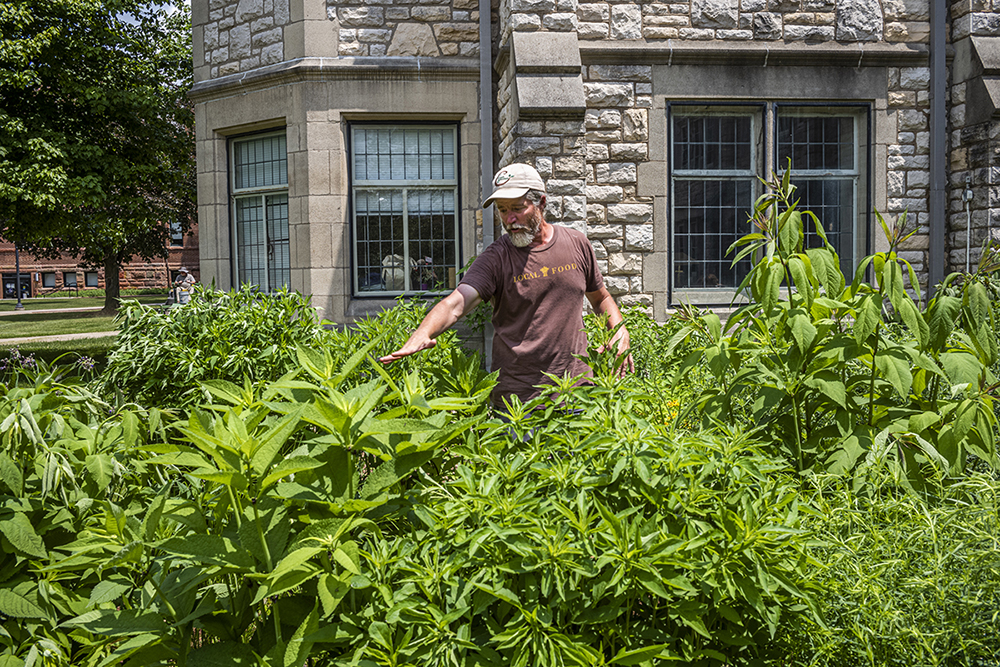
William Hope, associate professor of anthropology and sociology at Knox College, sweeps his hand over some of the deep-rooted native perennials at the rain garden outside Seymour Library on campus. (PHOTO BY DAVID ZALAZNIK)
Professor William Hope at Knox College works with students to harness observational skills with manual labor for an embodied understanding of the correlation between bioswales, deep-rooted perennials, the Anthropocene and experiential learning.
Hope, associate professor of anthropology and sociology, helped students design and install the campus’ first bioswale/rain garden outside Seymour Library. Subsequent rain gardens have been designed and installed on campus at the Hope Center (House of Peace and Equity) and the Whitcomb Art Center.
One student who worked on the first rain garden, Elleri Scriver, said he now sees pools of water and plants within a context of the ecology and human activity.
“It’s an incredible thing to be part of learning through theory, research and design. To see how everything works in our surroundings,” said Scriver, 20.
The impact of human activity on the ecology is evident globally, and is especially obvious in hydrology and storm water management. The Anthropocene era measures the impact of humans on the ecology. Since the industrial revolution and the onset of global climate change, flooding has become one of the most expensive environmental problems worldwide.
Bioswales are designed to deal with volumes of water running off impermeable surfaces like roofs, sidewalks, roads and parking lots. Even turf grass becomes impermeable after a heavy rain and water runs off causing erosion and flooding.
Hope said just one section of the Seymour library roof, about 850 to 900 square feet, channels about 500 gallons of water into the rain garden during a 1-inch rainfall.
“We are getting more water when it rains and more prolonged periods of drought,” he said, as global climate change progresses.
Installed in 2016, the library bioswale is designed to require little maintenance. Construction involved digging a slope 4 inches down from the surface of the lawn. The slope directs water from the roof into a basin that’s an additional 4 inches deep. In the event of a massive rain that could overwhelm the system, water could flow out into the lawn. However, in the five years since it was installed, rainwater has never overwhelmed the system.
Plants in the rain garden include spiderwort, bee balm, Joe Pye weed, wild geranium, hyssop, echinacea, blazing star, rattlesnake master and solidago.
These plants can tolerate large amounts of water as well as extended periods of drought. They are beloved by pollinators.
Hope starts the design process with “long and thoughtful observation.” He directs students to analyze where the water starts to accumulate on the roof — “our mountain tops.” He suggests starting “small and simple” because mistakes on that scale are easier to learn from and correct.
In terms of water, the mantra is “Slow it. Spread it. Sink it.” And always design for overflow situations.
“The landscape becomes our reservoir,” he said.
Gary Jacobs, landscape architect with Crawford, Murphy & Till, Inc. in Peoria, learned about the bioswales at Knox College and drove to Galesburg recently to examine them.
“I generally thought they were a wonderful inclusion, and I hope that more places can do similar projects,” said Jacobs.
He cautions, however, that ongoing maintenance is needed for bioswales to look good and function well.
Some of the maintenance issues are created and resolved with careful selection of plants and weeding out invasive species, he said.
Jacobs was able to speak with Knox College grounds director Brad Bergren and said they “spoke the same language: mostly the language of maintenance, maintenance, maintenance.”
Scriver, who expects to graduate in 2022, said work on the library bioswale helped him focus on the art of noticing, and that has “changed a lot of the ways I interact with my surroundings” and sharpened observational skills relevant to other courses at Knox.

Recent Comments